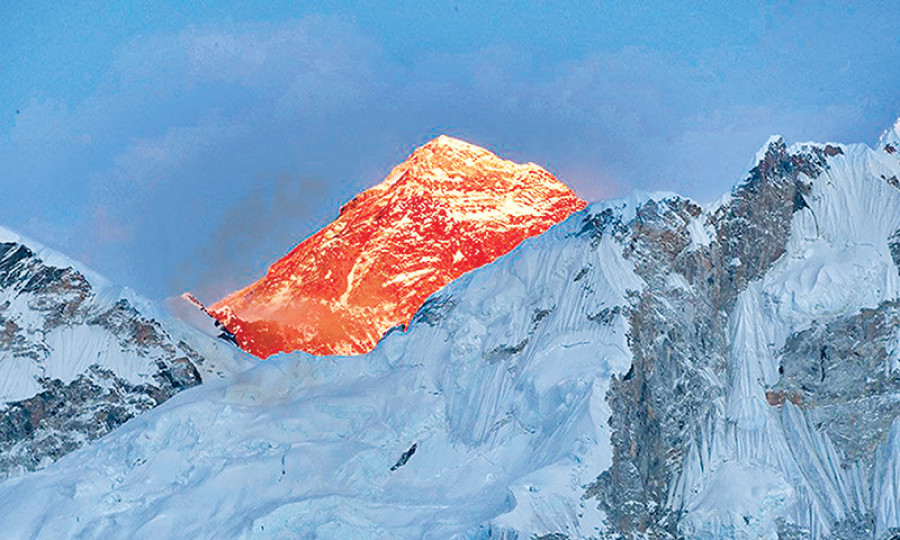Money
Mt Everest climbing regulation: Govt comes up with stringent safety rules
From now on, things are going to be tougher for Mt Everest aspirants as the government, in an attempt to improve safety of climbers, has announced some major changes in its policy.
Sangam Prasain
From now on, things are going to be tougher for Mt Everest aspirants as the government, in an attempt to improve safety of climbers, has announced some major changes in its policy.
The Cabinet’s Bill Committee on Thursday approved the amendment to the Mountaineering Expedition Regulation under the Tourism Act as proposed by the Department of Tourism. The new policy will be implemented from next year.
“The mountaineering regulation has been amended to improve safety of the climbers and has delegated more power to the Department of Tourism to function independently,” said Tourism Secretary Maheswor Neupane. “It has also ensured the rights of high-altitude Nepali guides and climbers.”
One of the major changes in the regulation is the mandatory provision of taking guides while climbing the mountains, including the world’s highest peak. “From now on, foreign climbers will be banned from making a solo attempt on Mt Everest,” said Neupane. It will ensure foreign climbers are in safe hands of Nepali high-altitude guides or climbers. Besides, it also means more jobs for Nepalis, said government officials. With the rise in the number of solo climbers on Mt Everest, the number of accidents has also increased in recent times. Vladimir Strba, 49-year-old Slovakian climber, and Swiss alpinist Ueli Steck died on Everest while making a solo climb this spring season (April-May).
However, it is unclear whether the government will allow foreign guides with the climbing licence to make solo bids or act as a climbing guide. The amended regulation means the blind and double amputees or the aspirants who do not have both arms and legs will be barred from making bids on mountain peaks.
An American Erik Weihenmayer became the first blind person to conquer Mt Everest on May 25, 2001. Mark Joseph Inglis of New Zealand is the first double leg amputee to summit the world’s tallest peak on May 15, 2006. He accomplished the feat after 40 days of climbing. A Nepali-born Canadian, Sudarshan Gautam, is the first double arm amputee to climb the world’s highest mountain on May 20, 2013.
“Besides, we have also adopted a strict provision to check the medical certificate of the climbers to determine whether they are physically fit to climb the mountains,” said Neupane.
Some officials expressed concerns that imposing ban on physically challenged people from making bids on Mt Everest could attract human rights issues. They said it’s the matter of discrimination.
The Everest climbing record suggests that a fewer physically challenged climbers have been involved accidents as they often hire more climbing guides to ensure their own safety compared to the ordinary climbers. Besides, they spend more time and money while fulfilling their dreams. The government has not fixed the upper age limit of the climbers. The revised regulation has not touched the existing provision on the lower age limit which prohibits climbers under 16 from making bids on Everest.
Likewise, the revised regulation allows the government to publish the names of mountains that are opened for climbing in the annex. The government has so far opened 414 mountains for commercial climbing among more than 1,300 peaks. Under the amended regulation, the government will also issue Mt Everest climbing certificate to high-altitude Nepali guides and workers hired by foreign climbers. These climbers are not required to pay climbing royalties to the government. Foreign climbers can obtain Everest climbing permit paying $11,000 each as royalty. The climbing fee for a Nepali climber is Rs75,000.
According to the department statistics, 4,879 climbers have summited Everest since Tenzing Norgay and Edmund Hillary’s historic ascent in May 1953. More than 300 have, however, died in the slippery slopes in their bid to reach the roof of the world.
KEY CHANGES
- Foreign climbers must be accompanied by a guide
- People who are blind are banned from climbing
- Double amputees (legs and hands) are banned from climbing




 9.89°C Kathmandu
9.89°C Kathmandu















